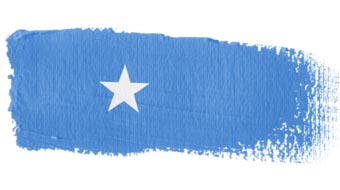 Doug Hendrie
Doug Hendrie
Friday, August 06, 2010
Somalia is no more. Since the colonial-made state collapsed under the weight of clan warfare in 1991, four fledgling entities have emerged to fill the political void.
 Somalia itself is still a shambles, its capital Mogadishu looking likely to fall to a hardline Islamic movement. Further north, unrecognised, lie the world's three newest entities - semi-autonomous Puntland and Galmudug and the independent state of Somaliland.
Somalia itself is still a shambles, its capital Mogadishu looking likely to fall to a hardline Islamic movement. Further north, unrecognised, lie the world's three newest entities - semi-autonomous Puntland and Galmudug and the independent state of Somaliland.
According to conventional wisdom in the West, Somalia has Balkanised. It is a failed state, one of many now dotting the world, recognisable by their collapsed governments, failed economies and reversion to survival living. The UN has spent an estimated $US2 billion creating and then propping up a Transitional Federal Government in Somalia in a bid to restore order.
The money was spent with the best intentions, and yet all it succeeded in doing was creating a new faction in the former nation's complex decentralised politics, and eventually, triggering a war. The emergence of the TFG forced the creation of the Islamic Courts Union, a militia emerging out of an effective system of government-by-judges. Effective, yet unrecognised and, due to its Islamic basis, deeply unpopular in the West.
The war moved back and forth, with interventions by US-backed Ethiopian troops to prop up the TFG, and now the TFG controls only the capital, Mogadishu. War triggered radicalisation in the ICU, and hardline, Al-Qaeda-linked youth - al-Shabaab - shouldered older and wiser heads into exile.
So what, exactly, has this infusion of money and military aid, this attempt to recreate up a Western-style post colonial state, achieved? A staggering backwards step for Somalia. The latest Western effort to impose democracy on a developing nation, the TFG is in the slow, painful process of dying. Why? Because Western-style democracy does not map well onto a geographical area with centuries-old clan alliances and rivalries - and with a successful, pre-existing system for dealing with them.
The plight of Somalia stands in stark contrast to the fate of its breakaway cousin to the north, Somaliland. After dictator Siad Barre's central government collapsed, the large Isaaq clan seized the opportunity for freedom from the hated regime. Creating the institutions of a state from the bottom up, Somaliland created itself as a stable, economically successful breakaway nation which has been seeking international acceptance as an independent entity in vain.
Far from the UN-imposed, American backed government, Somaliland's government formed from the bottom-up, creating a hybrid traditional-democratic political entity which operates as a power sharing mechanism between the main clans. While Somaliland strives for recognition as an independent state, it has achieved much by flying under the radar. No outsider has tried to force change on them; no-one has meddled with their creation as they have with Somalia proper. Despite the money and effort put into recreating Somalia as a Western-style democratic nation-state, able to protect its borders, lay claim to a mandate and fight against Islamists in neo-Cold War fashion, the Western mission has failed.
What is suited to Somalia appears, to the Western eye, to be a form of successful anarchy. When economist Peter Leeson decided to examine what happened to Somalia in the absence of a government, he found a most remarkable thing. Compared to the final years of dictator Barre's regime, 1985-1990, Leeson found that losing its government was the best thing that could have happened to Somalia. The number of people living on less than a dollar a day fell from 60 per cent to 43.2 per cent of Somalia's nine million people.
In fact, on nearly every indicator, the removal of the Somali state has been a tremendous boon to the Somali people. Life expectancy dropped two years in the last five years of sclerotic government rule - but in the new era, it has risen five. Somalia now boasts one of the best mobile phone networks on the entire continent. In fact, as Independent Institute analyst Benjamin Powell puts it, Somalia's living standards have "improved not only in absolute terms, but also relative to other African countries".
After the fall of the dictatorial government in 1991, the Somali traditional legal system arose once again to fill the void left by an unnecessary state. A stable, Islamic-influenced system of law without need of a state to back it, Xeer law punishes crime by forcing the perpetrator to compensate the victim. As Somali elder Dahir Mohamed Grasi told Legal Affairs last year, "Xeer is stronger than any government's laws. The government laws don't satisfy the people; they do not bring about a sufficient justice, and so they do not bring peace between the groups."
Backed by the universal religion of Islam, the Xeer law system expanded rapidly and began offering decentralised health and education services. As a model for dealing with conflicts between clearly-demarcated ethnic groups, Xeer law is a far better model for Somalia than the West's cherished democracy. Democracy gives power to the majority, but when the majority is one tribal group, then government is an extension of one tribe, and other groups are marginalised, leading to simmering resentment. The story of sub-Saharan Africa's fall into the hands of dictators is too often the story of how one tribal group gains power over its rivals. As Powell notes, the UN-backed Transitional Federal Government actually triggered another war in 2004, forcing the Islamic courts to group together and contest an imposed Western-style government. "It is the efforts to impose a government on Somalia that create chaos," writes Powell.
It is not only Somalia proper that has been misread and patronised by the West. The new region of Puntland, which seeks limited independence, is ruled by Abdirahman Mohamud Farole, a former PhD candidate at Australia's LaTrobe University. More peaceful than the South, Puntland is notorious for its active pirates, leading to the much-publicised Western anti-piracy operations.
But what is little known is that the Puntland pirates mutated out of a de-facto coast guard who were seeking to defend their territorial waters against large predatory fishing trawlers, who have stolen an estimated $100 million worth of tuna and shrimp to date, or worse, Mafia-owned company ships dumping toxic and radioactive waste, devastating fisheries and sickening thousands.
Somalia's failure to live up to Western ideals of a state has many lessons for the rest of the African continent, the last region on Earth colonised, and the last to decolonise. Africa's many strongmen dictators arose in the context of something very new for the region - huge geographical entities sometimes spanning hundreds of markedly different ethnic groups.
When the weakened European powers left their African colonies en masse in the wake of WWII, they left their arbitrary borders intact. This misguided Western attempt to impose nation-states on a region characterised by vast difference led to incalculable misery, as one by one, charismatic early leaders like the Congo's Patrice Lumumba gave way to the lethal Mobutu.
Many African nations have survived as geographic entities only through the application of brute force, when in fact, Balkanisation is the better option. The black south of Sudan has nothing in common with the Arab north, and the simmering resentment of the southerners at being treated as worthless and their mineral wealth leeched away north has led to the ongoing slaughter. The internecine conflict in the Democratic Republic of the Congo - often described as "Africa's World War" for the 5.4 million dead and the seven nations involved - has many roots in the colonial borders, with tribal groups such as the Katangese angered at their treatment by Mobutu's cronies.
The West has been guilty of maintaining the corrupt status quo in many African countries, particularly during the Cold War. Despite the wave of democratisation that followed the end of the US-Soviet proxy wars in the 1990s, dissatisfaction at the arbitrary colonial borders remains. The West has done little to help this situation, long preferring to prop up unviable states - inheritors of the arbitrary colonial divisions, states that frequently split tribal homelands.
But what Somalia proves is that a central, Western-style government is not a necessity. The years of existence as a headless state, in Somalia, did nothing to impede one of Africa's fastest growing economies. In fact, the absence of strongman rule and cronies with their hands out allowed business to flourish. Sadly for Somalia, Western countries prefer to deal with states like themselves, even to the point of manufacturing them. The West peddles democracy, pushing a flawed model onto populations where it cannot possibly work as a political mechanism.
Somaliland, on the other hand, has been fortunate to be free from Western meddling, free to create itself in a hybrid fashion, mixing old and new. The lesson of Somalia is that the future of African nations may well be a succession of fragmented states, more closely mirroring the majority ethnic groups. But this will only occur if the West ceases meddling in regions that it still does not understand.
Doug Hendrie is a freelance writer and writing teacher based in Melbourne. He has written for Sunday Life, Griffith Review, Yen and marie claire.